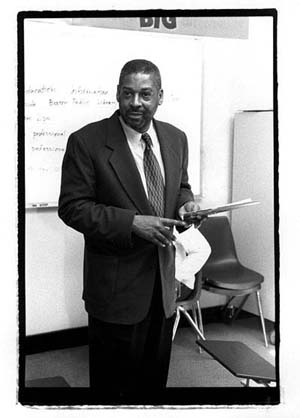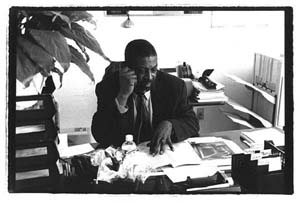 Recently,
Benjamin decided to leave the school bus company in the hands of his 26-year
old son and return to teaching as the Executive Director of Boston STRIVE
(Support and Training Results in Valuable Employees). Each of 25 STRIVE
programs worldwide teaches individuals from poor communities how to get
jobs.
Recently,
Benjamin decided to leave the school bus company in the hands of his 26-year
old son and return to teaching as the Executive Director of Boston STRIVE
(Support and Training Results in Valuable Employees). Each of 25 STRIVE
programs worldwide teaches individuals from poor communities how to get
jobs.
The program is not easy -- more than 75 percent of those who apply never make it to graduation. Every two months, 25-40 students enroll in a four-week workshop, attending daily classes from 9 AM to 5 PM. They must be both on time and at all times presentable. After graduation, the instructors become outplacement counselors for the students until they're employed, though the instructors are available to help graduates for another two years.
"I wanted to teach, and that is what we do," says Benjamin. Through teaching people how to get and keep jobs, and the importance of attitude in all facets of life, STRIVE reduces barriers to employment. It works -- STRIVE is, he says, "the most successful trainer of hard-to-employ urban youth in the country."
Those who succeed in STRIVE often do so quickly. "After the first four or five days in a workshop here, light bulbs go off in people's heads, and you can see that they start to get it," says Benjamin. "They start to say, 'Oh -- this is how it works, this is what it's about."
Benjamin draws parallels between instilling those light bulb moments in young adults, and his being a Masters of Education student at Cambridge College in the late 1970s. Beyond learning new things, he and his classmates often had self-knowledge epiphanies. "I learned how to put titles to things I already know, like, 'Oh, I know how to do a budget!' or, 'Oh yes I know how to supervise and manage,'" he recounts.
 In
short, he learned self-confidence. "It's the same confidence I'm
trying to give to 18- to 24-year olds who may not have a GED," he
says. But they have a role model. "They come and say to you, well
I can't do x, y, or z, and you say to them, 'Well, I was in jail, I got
a GED, if I can go from a GED to Harvard, there's nothing you can come
here and tell me you can't do. Absolutely nothing!'" says Benjamin.
"And when they understand that, and when you start validating them,
and you give them what they need to go out here and know that they can
compete, because they've seen someone do it. It's that sort of confidence
that you get at a Cambridge College," he says.
In
short, he learned self-confidence. "It's the same confidence I'm
trying to give to 18- to 24-year olds who may not have a GED," he
says. But they have a role model. "They come and say to you, well
I can't do x, y, or z, and you say to them, 'Well, I was in jail, I got
a GED, if I can go from a GED to Harvard, there's nothing you can come
here and tell me you can't do. Absolutely nothing!'" says Benjamin.
"And when they understand that, and when you start validating them,
and you give them what they need to go out here and know that they can
compete, because they've seen someone do it. It's that sort of confidence
that you get at a Cambridge College," he says.
Next: Glenola Mitchell